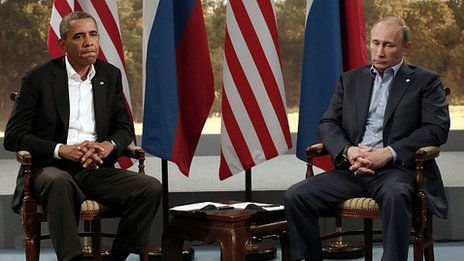Even before the Snowden affair, US-Russian relations were in trouble. The interaction and body language between Barack Obama and Vladimir Putin at the G8 summit in Northern Ireland in June was astoundingly tense.
After a meeting on the sidelines of the summit, the two men sat on stage for a few snapshots, silent and sullen, until they made an effort for the rolling cameras, said a few words and forced a smile or two.
Despite efforts to reset the relationship at the start of the first Obama administration, and make progress on some dossiers, the US and Russia remained far apart on issues like missile defence and nuclear arsenal reductions.
Despite acknowledged differences, they worked together on Iran and North Korea and other global issues. But they clashed very openly on Syria.
Since the war in Syria started in March 2011, Russia’s support for President Bashar al-Assad and America’s backing of the rebels has reawakened the worst of the Cold War dynamic between the two powers and given Moscow a proxy battleground to spite the West.
The return of Vladimir Putin to the presidency in May 2012 solidified that trend.
The White House had already been mulling whether to go ahead with the Obama-Putin summit or not. With no progress on any of the issues at stake, there would be nothing to announce after the talks, no deliverables – so why hold a meeting at the presidential level?
While Mr Putin seemed keen on the prestige of having such a meeting on his home turf, he was offering nothing in return – except another blow to the relationship.
Russia’s decision to grant whistleblower Edward Snowden asylum – and the timing of the move – infuriated Washington. It became impossible for the White House to justify the summit, especially to a domestic US audience.
Mr Obama has been criticised for being too soft on Russia. He was excoriated by Republicans last year when he was caught on an open microphone telling Russian Prime Minister Dmitry Medvedev to ask Mr Putin for more space, and saying that he would have more flexibility after his re-election.
Even the New York Times chimed in on 6 August, calling on the White House to cancel the summit.
“There is no reason for Mr Obama to attend unless Mr Putin provides solid assurances that he is prepared to address contentious issues in a substantive and constructive way. Otherwise, what’s the point?”
The decision to cancel the summit is a very rare diplomatic snub but the White House made it a very public one too.
When Mr Putin cancelled his visit to the US in May 2012, the White House went through all sorts of linguistic contortions to downplay the importance of his absence, insisting it was not a snub in an effort not to cause further upheaval in the relationship.
But there were no diplomatic niceties or talk about scheduling conflict to explain why the September meeting in Moscow was being cancelled. A stop in Sweden instead was immediately announced.
But during the Cold War, the US continued to talk to the Soviet Union even at the worst times. And so now too, the talks will continue, just not at the presidential level.
On Friday, the US secretaries of state and defence John Kerry and Chuck Hagel will meet their Russian counterparts Sergei Lavrov and Sergei Shoigu for previously scheduled talks in Washington.
From Mr Snowden, and the reduction of nuclear arsenals, to Iran and human rights, the agenda is heavy and the onus will be on the ministers to make some progress or at least keep the relationship somewhat on track.
The only issue where there could be a tangible outcome, if the two sides want it, is on the nuclear warheads, where talks for the reduction of the active stockpile have stalled.
The biggest victim of continued fallout between Russia and the US will be Syria.
The Obama administration still believes in a political solution to the conflict, and none can be reached without Moscow. But even when they talk, Moscow and Washington are nowhere near a common vision about how to end the conflict.
In 2009 when then Secretary of State Hillary Clinton presented her Russian counterpart Sergei Lavrov with a button symbolising the reset in the relationship, a translation error meant the word used in Russian actually meant ”overload”.
Four-and-a-half years later, overload now seems to be the accurate word to describe the state of US-Russian relations.





Leave a reply